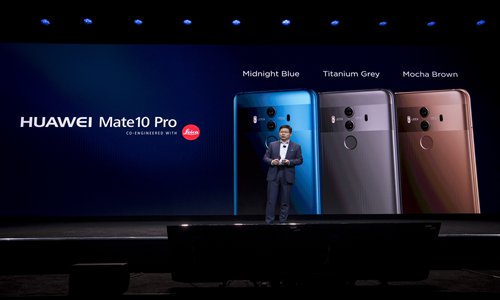
Richard Yu Chengdong, CEO of Huawei Technologies Co, holds the Mate 10 Pro smartphone while speaking during the company’s keynote event at the 2018 Consumer Electronics Show (CES) in Las Vegas, US, on Wednesday. Although a deal between Huawei and US telecom carrier AT&T fell through on Tuesday, the Chinese firm said it is still committed to the US market. Electric and driverless cars will remain a big part of this year’s CES. Photo: VCG
The collapse of Chinese technology giant Huawei Technologies Co's planned deal with US carrier AT&T Inc is more of a political issue than a business one, and it will escalate tensions between China and the US over trade and global competition.
The deal to sell Huawei's smartphones through AT&T was called off right before the partnership was set to be announced at the Consumer Electronics Show in Las Vegas, Nevada on Tuesday (US time). According to media reports, AT&T was pressured to cancel the deal after 18 lawmakers wrote a letter in December 2017 to the US Federal Communications Commission citing longstanding concerns about "Chinese espionage in general, and Huawei's role in that espionage in particular."
Since more than 90 percent of US consumers buy smartphones through carriers and none of the four major US carriers has a smartphone deal with Huawei, the Chinese company can only sell its devices through retailers and online stores in the US, even though it has become the world's No.3 smartphone maker.
Huawei's setback is not just a business issue. US lawmakers have not only blocked Huawei and other Chinese technology companies from entering the US market, they have also overstated and linked some simple commercial cases to national competition, which is obviously misleading.
There is no way that US political opposition to Chinese technology companies will stifle their development. Instead, the tensions caused by any blockage will only intensify the already fierce bilateral competition in the global market.
Despite its small market share in the US, Huawei operates in about 170 countries and regions, and it has cooperation agreements with 45 of the 50 leading global carriers.
It is also one of the world's top providers of telecom equipment, with a business covering not only emerging markets in Africa and the Middle East but also developed markets in Europe.
Specifically, Huawei, which is committed to exploring developed markets, has made significant progress in Europe with its premium devices and rapid technical innovation in recent years.
In September 2017, German operator Deutsche Telekom, in partnership with Huawei, launched Europe's first fifth-generation connection in Berlin.
Huawei's fast-growing share in the global telecom equipment market may be the reason that US lawmakers and security experts want to shut the company out of their market. But its success in Europe and other markets can only show how ridiculous the country's national security concern is.
The author is a reporter with the Global Times. bizopinion@globaltimes.com.cn

